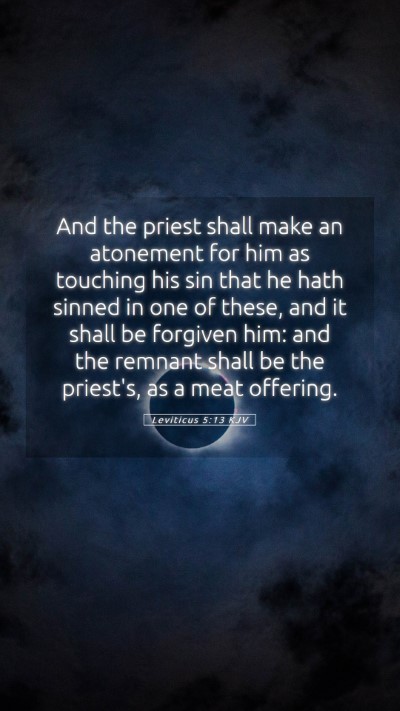Understanding Leviticus 5:13
The verse Leviticus 5:13 states:
"And the priest shall make an atonement for him concerning his sin that he hath sinned in one of these, and it shall be forgiven him: and the remnant shall be the priest's, as a meat offering."
Bible Verse Commentary
This biblical verse showcases important themes of atonement and forgiveness, central to the sacrificial system outlined in the Old Testament. The following insights combine explanations from public domain commentaries including those by Matthew Henry, Albert Barnes, and Adam Clarke.
Overview of Leviticus
Leviticus is primarily a manual for priests, outlining ceremonial laws and instructions for maintaining holiness among the Israelites. This chapter emphasizes the importance of responding to sin with appropriate sacrifices.
Key Themes in Leviticus 5:13
-
Atonement: The role of the priest in making atonement for the sinner is crucial. Matthew Henry notes that the priest acts as an intermediary between God and the sinner, signifying that forgiveness requires a process.
-
Forgiveness: The promise of forgiveness reinforces God's mercy. Albert Barnes points out that this demonstrates God's willingness to restore the sinner upon repentance and sacrifice, reinforcing the concept of grace even in the Old Testament.
-
Consecration of Offerings: Adam Clarke highlights the significance of the remaining offering as being consecrated to the priest. This indicates the importance of acknowledging those who serve in mediating between God and humans.
In-Depth Bible Verse Analysis
In this verse, we see a structured approach to dealing with sin, which was essential for the community's spiritual cleanliness and acceptance before God. It serves as a foundational understanding of biblical exegesis in relation to sin and atonement. The meticulous requirements for sacrificial offerings speak to the holiness of God and the need for atonement for sins, further highlighting how one must approach God with reverence.
Historical Context
Understanding the context of Leviticus helps grasp its depth. The Israelites were newly freed from slavery in Egypt and needed guidelines on worship and ritualistic practices to establish their relationship with God. This sacrificial system provided a tangible way for them to understand their sinfulness and the necessity of offering sacrifices, signifying the cost of sin.
Application of Leviticus 5:13 to Daily Life
For modern readers, Leviticus 5:13 emphasizes accountability and the importance of addressing sin. While Christians are no longer under the Old Covenant system of sacrifices, this verse serves as a reminder of the continuous need for repentance and seeking forgiveness from God:
- Recognize the significance of sin in your life and the importance of confession.
- Understand that forgiveness is available through sincere repentance.
- Acknowledge the role of spiritual leaders and the community in guiding individuals back to a right relationship with God.
Relevant Bible Cross References
- Exodus 30:10 – The role of atonement in the priestly system.
- Leviticus 4:26 – The instructions on the sin offering.
- Hebrews 10:4 – The insufficiency of animal sacrifices and the perfect sacrifice in Christ.
In conclusion, Leviticus 5:13 provides profound insights into the importance of atonement, forgiveness, and the roles of priests in the context of sin. Through understanding this scripture and its implications, believers can gain a deeper appreciation for grace and the necessity of repentance, which are foundational for spiritual growth and maintaining a relationship with God.
Further Study Recommendations
For those interested in delving deeper into the meaning of Bible verses, consider exploring:
- Bible study guides that focus on the Pentateuch.
- In-depth commentaries on Leviticus.
- Online Bible study platforms that offer discussions on Old Testament teachings.


